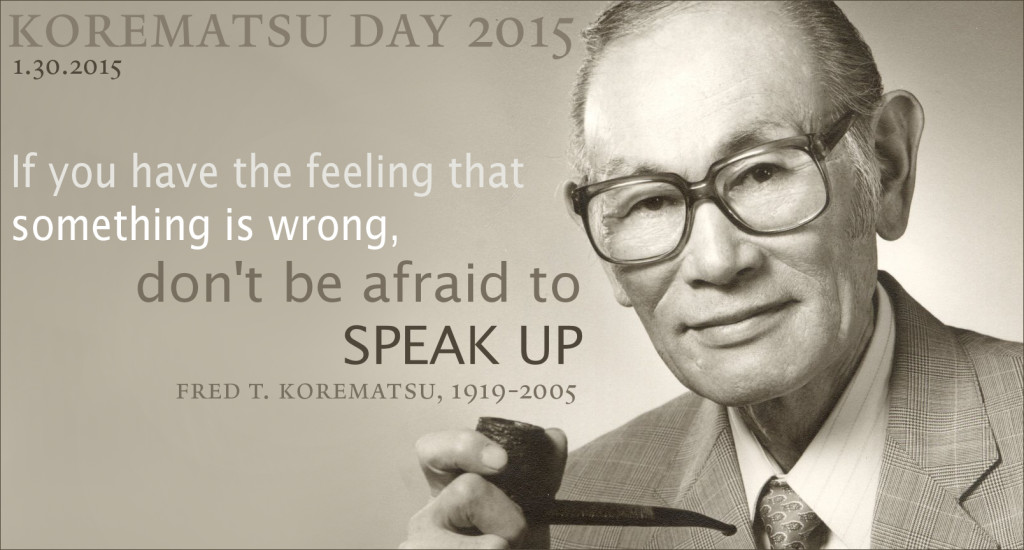Today is the 5th annual Korematsu Day, a state-wide holiday honouring civil rights hero Fred T. Korematsu that is celebrated in California on the anniversary of Korematsu’s birthday! Fred T. Korematsu defied the American government — his government — when it issued Executive Order 9066 which resulted in the internment of Japanese American in American concentration camps. Korematsu not only became a fugitive in his attempts to defy the racist and baseless order, but he later filed a Supreme Court case against the US government challenging the legality of the order.
After the jump, read an excerpt of my post on Fred T. Korematsu’s life and legacy, which I wrote last year.
From Fred Korematsu and the courage to defend your country by defying it:
Born on January 30, 1919 in Oakland, California to Japanese parents, Fred Korematsu pursued all the trappings of a typical American childhood. He attended public school, participated in the tennis and swim teams, and was conscripted to military service under the 1940 Selective Training and Service Act, which was passed by Congress to boost America’s military defenses in the face of the growing threats of World War II. Although he was rejected by the US Navy due to stomach ulcers, Korematsu was inspired to try and serve his country however possible and sought jobs as a welder at the local shipyard in order to help build American warships. In short, Fred Korematsu was a proud American citizen and a patriot.
Unfortunately, for most of his life, America treated him like a criminal, based solely on his race.
America of the 1940’s was a country of institutionalized and implicit racial segregation. Jim Crow laws were thriving in the South, and in California, casual intolerance of non-Whites was the norm. Throughout the country, foreign-born non-Whites — including Fred Korematsu’s parents — were still denied the right to naturalize, and even Japanese American citizens born on U.S. soil were treated with fear, suspicion, and outright hatred.
That seething undercurrent of anti-Japanese intolerance was whipped into a frenzy with Japan’s unannounced attack on Pearl Harbor, which claimed the lives of nearly 2500 American servicemen. Following Pearl Harbor and America’s entry into World War II, Japanese Americans were regarded with open hostility under the misguided belief that they were Japanese spies. President Franklin D. Roosevelt signed Executive Order 9066, unilaterally granting authority to the Secretary of War to designate certain areas of the country military areas and paving the way for one of the largest violations of American constitutional rights in this nation’s history.
In the wake of Executive Order 9066, 120,000 Japanese Americans of all ages — including roughly 80,000 US-born citizens — were subjected to curfews and other restrictions, and eventually forcibly relocated to mass prison camps, some no more than a collection of tents or sheds hastily-erected in the country’s harshest and most isolated environments behind barbed wire and under the careful guard of men armed with machine guns. In many camps, there was no heat, no running water, no privacy, and even insufficient toilets or showers. Internees were imprisoned in the camps without trial based solely on the fact of their racial and ethnic identities and forced to live under strict military control for years; this ugly episode of American history has been referred to as America’s “concentration camps”.
…
But, the myth of universal Japanese American acquiescence to internment is just that: a myth. The most notable — but hardly the only — example of Japanese American defiance to the unconstitutional internment of American citizens was Fred Korematsu’s refusal to comply to relocation orders.
In May of 1942, Japanese Americans throughout parts of the West Coast were ordered to report en masse to assembly centres prior to internment; Fred Korematsu refused. He never reported for internment.
This year, Korematsu Day is being honoured by Asian Americans around the country. Here are a few links to important articles and campaigns you should check out.
- Push Continues to Make Fred Korematsu Day a National Holiday (NBC News)
- Petition: Honor Fred Korematsu with a Google Doodle (18MillionRising)
- George Takei to Headline 5th Annual Korematsu Day on Jan. 30 (Korematsu Institute)
Please share this post, and my post from last year, to help spread Fred Korematsu’s story and legacy. You can also commemorate Fred Korematsu’s contribution to American history and civil rights by making a donation today to the Korematsu Institute.
And above all, never be afraid to speak up. Never stop standing up for what is right.

